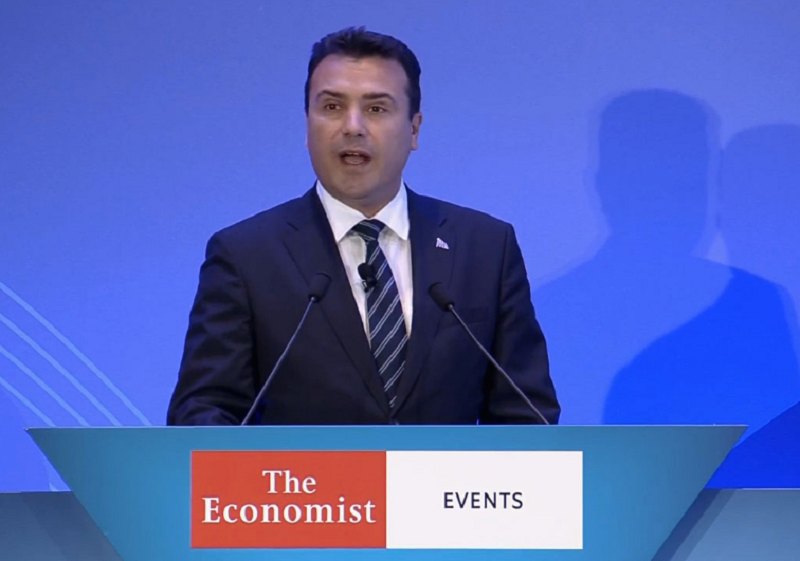Zaev: The good news for starting EU negotiations will have a positive impact on both the region and the EU

“The good news for the Republic of North Macedonia,” Zaev said, “will be good news for the EU too, because we are enthusiastic about the important role of EU as global actor and we remind of its core values for partisanship, solidarity and mutual prosperity.”
He said that one of the best news of the past was resolution of the long-standing dispute with Greece, which had serious negative bilateral and multilateral implications.
“The (Prespa) Agreement is catalyst of changes since it testifies a new transformation process in the Balkans. For my country, this agreement, along with the Treaty of Good-Neighbourliness with Bulgaria, has opened the door to achieving the strategic goals: NATO and EU membership. The Republic of North Macedonia has received the good news that it will become NATO’s 30th NATO. Sometimes we quickly forget where we were just two or three years ago and where we are today. My political career is a testimony that you have to take a deep breath when it is most difficult and not forget that in your vision are citizens living better and happier just because of a few bold steps that you are ready to take,” Zaev said.
Zaev noted that the region is being an example of unity and by inventive solutions can overcome problems. “Even a small country as North Macedonia can bring message of freshness, change and hope and be good news,” Zaev said referring that Prespa Agreement is a true example of the power of diplomacy and dialogue.
“It is a useful example for many other open issues. Every problem is different and specific, but dialogue and diplomacy remain the best approach in addressing them. As leaders in our countries we owe it to the citizens to resolve the problems, maintain peace and create conditions for development and better life for all,” Zaev said.
“We are awaiting the good news of bringing the region closer to the EU. We are particularly glad that the German Bundestag voted five days ago in favor of getting a date for the opening of EU accession negotiations with North Macedonia and Albania in October. The move is an acknowledgment of the concrete progress the countries have made, but also refers to the EU’s credibility and commitment to its enlargement agenda,” Zaev said, stressing the importance of our neighbors, EU member states that expressed clear support to North Macedonia’s start of EU accession talks during last week’s UN General Assembly in New York.
“I believe that the good news for starting negotiations with the EU will have a positive impact on the entire region, a message will be sent that the Western Balkans is an integral part of Europe, the progress of reforms and investment in resolving thorny problems will be recognized thus encouraging the countries to show political courage to overcome their problems,” Zaev added.
“A stable Balkan region is in the EU’s interest, especially geopolitically, geoeconomically and in terms of security. Closer cooperation with EU member states helps to address the challenges that are crucial to the EU agenda such as climate change, energy, environment, security and migration. The good news for the Republic of North Macedonia,” Zaev said, “will be good news for the EU too, because we are enthusiastic about the important role of EU as global actor and we remind of its core values for partisanship, solidarity and mutual prosperity.” Zaev said.
Today, as Zaev underlined, here through The Economist Western Balkans Summit we want the world to hear the good news that this region has changed and that the region will no longer be trapped in conflicts and a hopeless future.
“The era of manipulative nationalist rhetoric is over. Together we strive for a brighter future. The Berlin Process has achieved the goal of raising the interest of the Western Balkans and putting it on the map of EU member states’ cooperation. Implementation of the connectivity agenda of Berlin Process and multi-annual action plan on a regional economic area have important goal to accelerate the development of the region and to improve the quality of life of our citizens. The region is actively talking about digitization, common access to European and global markets, customs facilitation, joint border crossings, funds for innovations,” Zaev said.
The Economist Western Balkans Summit continues with addresses of the former US Assistant Secretary of State for European and Eurasian Affairs Wess Mitchell, SYRIZA leader and former Greek PM Alexis Tsipras, former Belgian PM Guy Verhofstadt, former European Parliament president Martin Schulz.